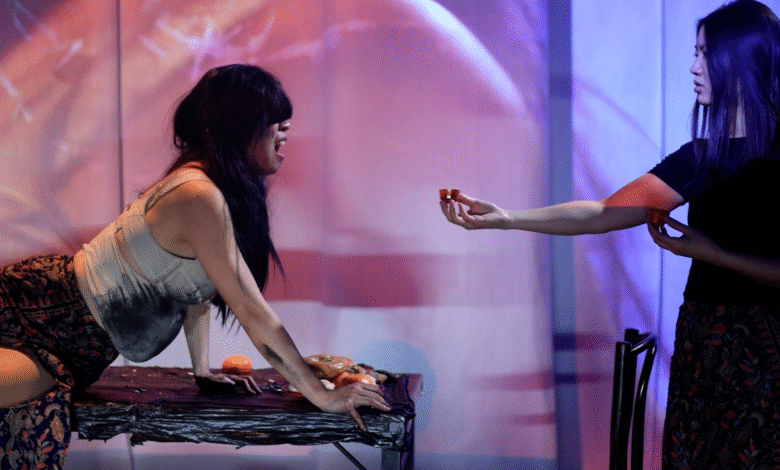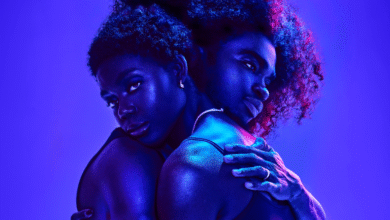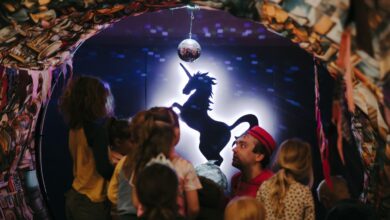Interview: Spooks, spirituality and social standards
Prayers for a Hungry Ghost, The Barbican
Elisabeth Gunawan on Prayers for a Hungry Ghost, playing at Halloween
Halloween is the perfect time to visit the Barbican this year, as The Pit hosts the premiere of Prayers for a Hungry Ghost, written by award-winning company KISS WITNESS and created through the Barbican’s prestigious Open Lab talent development programme. Described as a production that combines horror, physical performance, dark comedy and Chinese mythology, this is certainly a show we at Everything Theatre wanted to know more about. We checked in with award-winning Chinese-Indonesian theatre maker, performer and writer Elisabeth Gunawan to see what she could manifest for us!
Hi Elisabeth, thanks so much for telling us about Prayers for a Hungry Ghost. Could you talk about how Chinese mythology, particularly the idea of ‘hungry ghosts’, informs both the production’s setting and emotional landscape?
In Buddhist lore, hungry ghosts are believed to be the restless spirits of people who, in life, were violent, greedy, or clinging. They are often depicted with enormous empty bellies and mouths full of fire, so that everything they try to eat turns to ash. The Hungry Ghost Festival marks the one day of the year when these spirits are allowed to return to earth. Across East and Southeast Asia, people make offerings of food, set out water and washcloths for the ghosts to refresh themselves, and burn paper offerings. In some traditions, even concerts are held where the first row of seats is left empty for the ghosts.
Beyond the mythological setting, we’re told the story is rooted in a family dynamic. Can you share how the characters develop and reflect the show’s central tensions?
With the play, we want to bring the audience into the realm of the hungry ghost. The inhabitants include the ambitious yet remorseful Father (played by Daniel York Loh), his frenzied and desperate daughter Big Sister (played by yours truly), and the lingering spectre of Little Sister (played by Jasmine Chiu) who has been spared from the karma of being a hungry ghost, but nevertheless her figure is vivid in the memories of her sister and father. The style of the piece is very physical and visceral, so we’re really meeting the emotional shards and the souls of these characters. The teller of the story is the hellscape itself, guided by the Heibai Wuchang (grim reapers from Chinese mythology, which in our version are dressed in Singapore Airlines stewardess uniforms!). These souls reenact the choices that had led to the deepening of their own suffering: will they ever truly learn to let go? (Spoiler alert: yes, but not without a fight!)
What kinds of perspectives and energies did your collaborators bring into the room and how have they shaped what we’ll see on stage?
The entire team is extremely diverse, not just in terms of lived experience but also discipline. Many of our artists are part of the Chinese diaspora, each bringing a different nuance of ‘Chineseness’—from Taiwan, Singapore, Malaysia, Indonesia, and Hong Kong. Alongside them are artists with migrant perspectives from Europe and the UK, which adds yet another layer of dialogue and complexity.
We also draw from a wide range of disciplines. We have dance and movement through the work of Matej Matejka, Tang Sook Kuan, and Jasmine Chiu; writing and poetry through Daniel York Loh; and sound and music through LI YI LEI. If you gave me all the resources in the world, I couldn’t find you a better team! We’ve been working together on this project since 2023, and over that time we’ve built a deep trust in one another. There is a strong existential desire in all of us to finally bring this work to life and to share it with an audience.
Can you share how different forms such as horror, live cinema and movement helped you stage the unspeakable or intangible aspects of trauma? And why was it important for you to weave in dark humour or tenderness amid the horror?
In Southeast Asia, horror films have always been incredibly popular, but they’re also more than pulp entertainment. They often carry a moral dimension, showing what kinds of behaviours are celebrated and what kinds might condemn you to becoming a ghost. In that sense, ghosts and hauntings aren’t only tropes of the horror genre, but manifestations of absences, erasures, and unresolved histories. The ghosts we put on stage echo the everyday horrors people live with — intergenerational trauma, systemic racism and misogyny. We want to harness the visceral power of horror as a genre to explore the psychological complexity of individuals and communities that have historically been marginalised.
Can you speak about the role of language in the piece, with parts in English, Mandarin, Cantonese, and Malay? What does that multilingualism allow theatrically or emotionally?
The multilingualism mirrors who we are as a team. Most of us are migrants and part of the East Asian or Chinese diaspora (from Singapore, Malaysia, Indonesia, Hong Kong, Taiwan and more!), each with our own idiosyncrasies and nuances. Including Malay, Mandarin and Cantonese evokes different worlds and memories that are particularly potent for other East Asian audiences. But it also creates a theatrical texture that everyone can feel — shifting between languages opens up space for intimacy, distance, and even moments of not-quite-understanding, which mirrors the experience of migration and family histories. As KISS WITNESS, part of our company ethos is to decolonise the imagination, and I think it’s enriching to create a piece of theatre that decentres Eurocentric ways of seeing the world.
This premiere coincides with Halloween, but also draws on the Hungry Ghost Festival. Is there a particular meaning in bringing these two traditions together, and how do they shape the world or themes of the show?
For me, ghosts are a vehicle for reckoning with the erasure of the past and for witnessing past suffering. I can only speak personally, but my grandparents and parents lived through the kind of violence and political instability I could never imagine; experiences they refuse to talk about now — and probably never will. Speaking to ghosts, or making space for them, offers a hope to witness their grief — because grief needs a witness! It also offers some hope for redemption and reconciliation, even if it’s only in our imagination. In many parts of East Asia, it is customary to make a ritual for the ghosts before entering the theatre, and we will be doing the same. Ghosts exist if you believe in them, and in that belief lies a beautiful chance to wrestle with life’s unanswerable questions. I think that is something enriching to add to the conversation, especially in a world where Halloween has become so commodified.

Finally, what do you hope the show will offer to its audience?
KISS WITNESS’s ethos is to harness the power of theatre to create imaginary spaces — particularly spaces of belonging for people who don’t have them in real life. Through theatre, we are given a second chance to witness moments of trauma that may have happened in isolation. In the theatre, however, we can re-experience these moments in the safety of our imagination and our community, and perhaps find some hope for reconciliation and repair.
As an East Asian–led company, we also want to go beyond representation and move towards constructing an East Asian consciousness. We want to show our inner worlds and our points of view, which are not uniform, in order to make visible that East Asian people are not just minoritised bodies — we are psychologically real.
Ultimately, I want people to feel seen and to leave with a greater sense of connection. I know it’s ambitious but I believe the theatre should have the ambition of engaging with audiences deeper than the level of polite society, towards collective consciousness raising.
Thanks very much to Elisabeth for sharing this insight into what promises to be an exciting production. Prayers for a Hungry Ghost premieres at the Barbican Pit from Wednesday 29 October – Saturday 1 November.
Creating Theatrical Worlds: A visual language workshop for young creatives led by artist and Prayers for a Hungry Ghost stage designer Erin Guan (Thu 30 Oct, 5pm) will also give you entry to the performance of Prayers for a Hungry Ghost on Thu 30 Oct 7.45pm.








One Comment